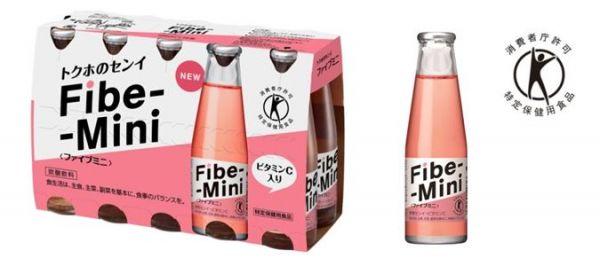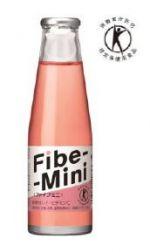Against a background of declining intake of dietary fiber due to increasingly westernized eating habits, Fibe-Mini was developed by a female researcher who believed that dietary fiber was important for young women in particular. Product specifications, flavor, volume, and package design were developed through trial and error, resulting in the 1988 debut of Fibe-Mini as an appealing dietary fiber beverage that would be easy for women to consume on a regular basis.
Consistently marketed as a "new type of beverage offering a delicious, easy way to supplement dietary fiber," Fibe-Mini was approved as a Food with Specified Health Uses when dietary fiber content was boosted to 6g in 1996.
At present, the Fibe-Mini product lineup includes Fibe-Mini (Food with Specified Health Uses),
FIBE-MINI PLUS, and FIBE-MINI JELLY.
Otsuka Pharmaceutical Co., Ltd.
Renewal of Fibe-Mini Dietary Fiber Beverage Food for Specified Health Uses Now Contains Lycopene - Renewal Launch with New Package and Logo Design -
- April 17, 2017 marks the renewal launch of dietary fiber beverage Fibe-Mini, a Food for Specified Health Uses (FOSHU) to regulate gastrointestinal condition. Approaching its 30th anniversary of its 1988 debut, this marks the first renewal since Fibe-Mini received FOSHU approval in 1996.
- Containing 6,000mg of dietary fiber to supplement often inadequate intake and 300mg of vitamin C, new Fibe-Mini also contains lycopene (tomato pigment).
- Featuring a new package and logo design conceived to appeal to women in particular, Fibe-Mini has been renewed as an approved FOSHU dietary fiber beverage that supports health and beauty.

Tokyo, Japan -- Otsuka Pharmaceutical Co. Ltd. (Head Office: Tokyo, Japan; President: Tastuo Higuchi) has announced the renewal of FIBE-MINI, an approved Food for Specified Health Uses (FOSHU), with shipments of the new product beginning on April 17.
Fibe-Mini was originally launched in 1988, a time when intake of dietary fiber was declining from year to year due to changes in Japanese lifestyles and eating habits. Fibe-Mini created new market value as a beverage that made it easy to supplement intake of dietary fiber. Approved as a Food for Specified Health Uses in 1996, Fibe-Mini, approaching the 30th anniversary of its 1988 debut, has earned an extensive following as a dietary fiber beverage that helps regulate gastrointestinal condition.
In recent years, the market for Foods with Specified Health Uses for gastrointestinal regulation (dietary fiber) is expanding on an annual basis*1, but dietary fiber intake remains inadequate among all Japanese age groups, a trend that is even more pronounced among younger people*2. Recommended target intake of dietary fiber for Japanese women is 18g*3 or more, but actual fiber intake by women in their 20s averages around 12g*3 per day, approximately six grams less than recommended intake.
Aiming to contribute to healthy gastrointestinal condition by providing 6g of dietary fiber, the renewed version of Fibe-Mini contains lycopene (tomato pigment) and features a new package and logo design, conceived to appeal to women in particular. This is the first product renewal since Fibe-Mini received FOSHU approval in 1996. Offering a delicious way to obtain 6,000mg of dietary fiber - often lacking in today's diets - and 300mg of vitamin C, Fibe-Mini helps regulate gastrointestinal condition to support women's health and beauty from the inside out.
Based on our corporate philosophy of 'Otsuka - people creating new products for better health worldwide', Otsuka Pharmaceutical is dedicated to the development of innovative products that contribute to the health of people around the world.
- 1Foods with Specified Health Uses Market Analysis, 2016 (Sogokikaku Center Co, Ltd)
- 2Summary Results of National Health and Nutrition Survey, 2015
- 3Dietary Reference Intakes for Japanese (2015)
About Fibe-Mini

About Dietary Fiber
For many years, dietary fiber was considered to be a non-essential nutrient, but from the 1970s onward, important health functions became a focus of increased interest and dietary fiber is now considered the "sixth major nutrient."
Changes in lifestyle and diet and other factors have led to a steady decline in Japanese people's intake of dietary fiber. Less frequent consumption of foods rich in dietary fiber such as vegetables, fruits, seaweeds and mushrooms and increased consumption of meat and fish are factors contributing to the decline in dietary fiber intake. According to the 2015 edition of Dietary Reference Intakes for Japanese, the daily target amount of dietary fiber for those 18 - 69 years of age is 20 grams or more for men, and 18 grams or more for women. However, according to the 2015 National Health and Nutrition Survey, Japanese people of all ages do not get enough fiber in their daily diets.





